| Listing 1 - 10 of 33 | << page >> |
Sort by
|
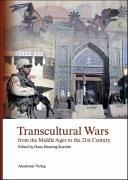
ISBN: 3050049952 9783050049953 9783050041315 3050041315 Year: 2006 Publisher: Berlin : Akademie,
Abstract | Keywords | Export | Availability | Bookmark
 Loading...
Loading...Choose an application
- Reference Manager
- EndNote
- RefWorks (Direct export to RefWorks)
Eine von der Deutschen Forschungsgemeinschaft getragene Forschergruppe an der Universität Regensburg untersucht seit einigen Jahren im Rahmen einer Neuen Militärgeschichte "Formen und Funktionen des Krieges im Mittelalter". Im März 2004 wurde auf einer international und interdisziplinär ausgerichteten Fachtagung, organisiert von Mitgliedern der Regensburger Forschergruppe zusammen mit dem Hamburger Institut für Sozialforschung, versucht, traditionelle Epochengrenzen, wie sie zwischen Mittelalter und Neuzeit nach wie vor bestehen, zu überwinden. Einen vielversprechenden Ansatz hierfür bot die gerade in jüngster Zeit sehr kontrovers geführte Debatte über die "Kulturen des Krieges" (John Keegan) und die mit ihr untrennbar verbundene Frage nach der typologischen Verortung der jeweiligen Konflikte. Anhand der Kategorie des "transkulturellen Krieges" wurde der Frage nachgegangen, welche Gemeinsamkeiten es zwischen mittelalterlichen und neuzeitlichen Kriegen gibt, wie neu die derzeit viel beschriebenen "Neuen Kriege" wirklich sind. Darüber hinaus wurde epochenübergreifend untersucht, was Krieg zwischen Kulturen ausmacht und wie er sich typologisch fassen lässt. War is a predominant theme in medieval as well as in modern historical research. Whereas both disciplines tend to dwell on this topic separately, this volume aims at crossing the artificial line of division between medieval and modern wars. War is regarded as a historical phenomenon the continuitiesof which prevail over any time-specific alternations. A special kind of war is the one waged between or on the line of different cultures. Such transcultural wars are currently a widespread phenomenon - but have been on the agenda throughout history. Different examples and aspects of transcultural wars are discussed in this volume. All papers were presented and discussed at a international conference held in Regensburg in March 2004 which brought war-specialists of the Middle Ages and the Modern Period together. With regard to the category of "transcultural" wars the question has been raised what medieval and modern wars have in common and whether the so called "New Wars" are that new at all. On top of that it has been examined what characteristics can be ascribed to transcultural wars, what makes these wars special and how they can best be classified.
Military history, Medieval. --- Military history, Modern. --- Culture conflict --- Cultural conflict --- Culture wars --- Conflict of cultures --- Intercultural conflict --- Social conflict --- Modern military history --- Medieval military history --- History.
Book
ISBN: 0814771475 081477136X 9780814771365 9780814738122 0814738125 9780814795170 081479517X Year: 2015 Publisher: New York London New York University Press
Abstract | Keywords | Export | Availability | Bookmark
 Loading...
Loading...Choose an application
- Reference Manager
- EndNote
- RefWorks (Direct export to RefWorks)
Despite many Americans’ triumphant proclamations that Barack Obama’s 2008 and 2012 elections signified a post-partisan, post-racial society, it seems that the United States is more divided than ever. From the rise of the Tea Party, to strident anti-immigration and anti-welfare movements, to the so-called “war on women”, the United States on its surface appears to be caught in the turmoil of a culture war that has not relented since the Reagan era. But, as John Dombrink writes in The Twilight of Social Conservatism, the conservative backlash seen during Obama’s presidency is indicative not of a rising social conservative force in society, but of a waning one.Drawing on demographic research, political polls, contemporary media, and internet commentary, Dombrink demonstrates that the vitality of major social conservative ideas from the culture war era has faded. Support for once-divisive wedge issues, like same-sex marriage and reproductive rights, has increased dramatically, and Americans, particularly young Americans, are less religious and more libertarian than ever before. As he traces the end of the culture wars and the “unwedging” of American politics over the last eight years, Dombrink is quick to caution that social conservatism has not disappeared entirely from view. Nevertheless, the once-prominent “Moral Majority” pushing for dominance in American culture is now reconsidering itself as a minority, and Dombrink argues that it is unlikely that social conservative forces will ever regain the power and potency they once held in American politics. A comprehensive and insightful work, The Twilight of Social Conservatism deftly analyzes the liberalizing trends that created the social and political culture America has today and that portend to the culture America will have in years to come.
Christianity and culture --- Politics and culture --- Conservatism --- Culture conflict --- Social values --- Cultural conflict --- Culture wars --- Conflict of cultures --- Intercultural conflict --- Social conflict --- United States --- Politics and government. --- Government --- History, Political --- Politics and government
Book
ISBN: 9789059086289 9789048528196 9789048528202 9789089649270 9089649271 Year: 2015 Publisher: Leuven Davidsfonds
Abstract | Keywords | Export | Availability | Bookmark
 Loading...
Loading...Choose an application
- Reference Manager
- EndNote
- RefWorks (Direct export to RefWorks)
Islam --- International relations. Foreign policy --- Middle East --- Polemology --- Conflict [Culturele ] --- Conflit culturel --- Cultural conflict --- Culturele conflict --- Fondamentalisme musulman --- Fundamentalism [Islamic ] --- Fundamentalisme [Islamitisch ] --- Integralisme [Islamitisch ] --- Integrisme [Islamitisch ] --- Intégrisme islamique --- Intégrisme islamique -- Aspect politique --- Intégrisme musulman --- Islam and politics --- Islam and state --- Islam en Staat --- Islam en politiek --- Islam et Etat --- Islam et politique --- Islamic fundamentalism --- Islamic integralism --- Islamism --- Islamisme --- Islamisme politique --- Islamisme radical --- Islamistes --- Islamitisch fundamentalisme --- Islamitisch integralisme --- Islamitisch integrisme --- Mouvements islamistes --- C8 --- Midden-Oosten (x) --- oorlog --- Ideologie en politiek --- IS (Organization) --- Terrorism --- Religious aspects --- Syria --- Islamic countries --- Iraq --- History --- 21st century --- Politics and government --- Foreign relations --- 2003 --- -Cultural conflict

ISBN: 3432999712 Year: 1992 Publisher: Stuttgart Enke
Abstract | Keywords | Export | Availability | Bookmark
 Loading...
Loading...Choose an application
- Reference Manager
- EndNote
- RefWorks (Direct export to RefWorks)
Cohabitation pluri-ethnique --- Ethnic minorities --- Ethnic relations --- Etnische minderheden --- Etnische relaties --- Groupes ethniques -- Relations --- Interethnic relations --- Minderheden --- Minderheidsgroepen --- Minorities --- Minority groups --- Minorités --- Minorités ethniques --- Relaties [Etnische ] --- Relations among ethnic groups --- Relations entre groupes ethniques --- Relations ethniques --- Relations interculturelles --- Relations interethniques --- #SBIB:021.GIFTSOC --- #SBIB:316.8H16 --- Culture conflict --- -Culture conflict --- -Cultural conflict --- Culture wars --- Conflict of cultures --- Intercultural conflict --- Social conflict --- Foreign population --- Persons --- Assimilation (Sociology) --- Discrimination --- Majorities --- Plebiscite --- Race relations --- Segregation --- Inter-ethnic relations --- Acculturation --- Ethnic groups --- Ethnology --- Social problems --- Sociology --- Welzijns- en sociale problemen: migranten, rassenrelaties --- Germany --- Ethnic relations. --- Culture conflict. --- Minorities. --- -Welzijns- en sociale problemen: migranten, rassenrelaties --- Cultural conflict
Book
ISBN: 9781441143891 Year: 2016 Publisher: London Bloomsbury Book Auctions
Abstract | Keywords | Export | Availability | Bookmark
 Loading...
Loading...Choose an application
- Reference Manager
- EndNote
- RefWorks (Direct export to RefWorks)
There is a vigorous debate on the exact beginnings of the Crusades, as well as a growing conviction that some practices of crusading may have been in existence, at least in part, long before they were identified as such. The Prehistory of the Crusades explores how the Crusades came to be seen as the use of aggressive warfare to Christianise pagan lands and peoples. Reynolds focuses on the Baltic, or Northern, Crusades, an aspect of the Crusades that has been little documented, thus bringing a new perspective to their historical and ideological origins.Baltic Crusades were distinctive because they were not directed at the Holy Land, and they were not against Muslim opponents, but rather against pagan peoples. From the Emperor Charlemagne's wars against the Saxons in the 8th and 9th centuries to the Baltic Crusades of the 12th century, this book explores the sanctification of war in creating the ideal of crusade. In so doing, it shows how crusading ultimately developed in the 12th and 13th centuries. The Prehistory of the Crusades provides a valuable insight into the topic for students of medieval history and the Crusades.
Crusades. --- Missions --- Culture conflict --- Cultural conflict --- Culture wars --- Conflict of cultures --- Intercultural conflict --- Social conflict --- Christian missions --- Christianity --- Missions, Foreign --- Religion --- Theology, Practical --- Proselytizing --- Church history --- Middle Ages --- Chivalry --- History --- Baltic States --- History. --- Croisades --- Conflit culturel --- Aspect religieux --- Église catholique --- Pays baltes --- Église catholique. --- Crusades
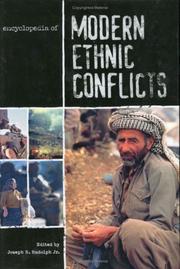
ISBN: 0313313814 Year: 2003 Publisher: Westport ; London Greenwood Press
Abstract | Keywords | Export | Availability | Bookmark
 Loading...
Loading...Choose an application
- Reference Manager
- EndNote
- RefWorks (Direct export to RefWorks)
Ethnic relations --- Culture conflict --- Relations interethniques --- Conflit culturel --- Political aspects --- Encylopedias --- Encyclopedias --- Aspect politique --- Encyclopédies --- 327.5 "19" --- 327.5 <031> --- -World politics --- -Colonialism --- Global politics --- International politics --- Political history --- Political science --- World history --- Eastern question --- Geopolitics --- International organization --- International relations --- Inter-ethnic relations --- Interethnic relations --- Relations among ethnic groups --- Acculturation --- Assimilation (Sociology) --- Ethnic groups --- Ethnology --- Social problems --- Sociology --- Minorities --- Race relations --- Cultural conflict --- Culture wars --- Conflict of cultures --- Intercultural conflict --- Social conflict --- Internationale conflicten. Internationale spanningen. Internationale blokvorming. Veiligheidspolitiek--20e eeuw. Periode 1900-1999 --- Internationale conflicten. Internationale spanningen. Internationale blokvorming. Veiligheidspolitiek--Encyclopedieën. Lexica --- -Internationale conflicten. Internationale spanningen. Internationale blokvorming. Veiligheidspolitiek--20e eeuw. Periode 1900-1999 --- 327.5 <031> Internationale conflicten. Internationale spanningen. Internationale blokvorming. Veiligheidspolitiek--Encyclopedieën. Lexica --- 327.5 "19" Internationale conflicten. Internationale spanningen. Internationale blokvorming. Veiligheidspolitiek--20e eeuw. Periode 1900-1999 --- -Cultural conflict --- Colonialism --- Encyclopédies --- World politics --- 1995-2005
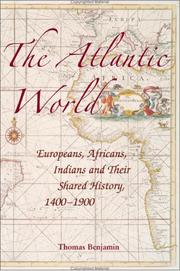
ISBN: 9780521616492 9780521850995 0521616492 0521850991 Year: 2009 Publisher: Cambridge [etc.] Cambridge University Press
Abstract | Keywords | Export | Availability | Bookmark
 Loading...
Loading...Choose an application
- Reference Manager
- EndNote
- RefWorks (Direct export to RefWorks)
History of North America --- History of Latin America --- History of Europe --- History of Africa --- anno 1500-1799 --- anno 1400-1499 --- anno 1800-1899 --- History, Modern. --- Culture conflict --- Histoire moderne et contemporaine --- Conflit culturel --- History. --- Histoire --- Atlantic Ocean Region --- Atlantique, Région de l' --- Atlantique, Région de l' --- History, Modern --- Modern history --- World history, Modern --- World history --- Cultural conflict --- Culture wars --- Conflict of cultures --- Intercultural conflict --- Social conflict --- History --- Atlantic Area --- Atlantic Region
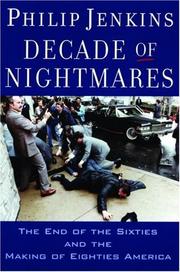
ISBN: 9780195178661 0195178661 Year: 2006 Publisher: Oxford [etc.] Oxford University Press
Abstract | Keywords | Export | Availability | Bookmark
 Loading...
Loading...Choose an application
- Reference Manager
- EndNote
- RefWorks (Direct export to RefWorks)
Political sociology --- Sociology of culture --- anno 1960-1969 --- United States --- Social problems --- Culture conflict --- Conservatism --- Political culture --- Problèmes sociaux --- Conflit culturel --- Conservatisme --- Culture politique --- History --- Histoire --- Etats-Unis --- Politics and government --- Social conditions --- Politique et gouvernement --- Conditions sociales --- Cultural conflict --- Culture wars --- Conflict of cultures --- Intercultural conflict --- Social conflict --- Reform, Social --- Social reform --- Social welfare --- Social history --- Applied sociology --- Problèmes sociaux --- 1969 --- -United States --- 1961-1969 --- 1945-1989 --- 1945 --- -Social problems --- 20th century --- United States of America
Book
ISBN: 9155438067 9789155438067 Year: 1996 Volume: 35 Publisher: Stockholm: Almqvist och Wiksell,
Abstract | Keywords | Export | Availability | Bookmark
 Loading...
Loading...Choose an application
- Reference Manager
- EndNote
- RefWorks (Direct export to RefWorks)
Noord-Europa --- Culture conflict --- Culture diffusion --- -Culture diffusion --- -Cultural diffusion --- Diffusion of culture --- Culture --- Social change --- Cultural conflict --- Culture wars --- Conflict of cultures --- Intercultural conflict --- Social conflict --- Baltic Sea Region --- -Literatures --- -History and criticism --- -Baltic Sea Region --- Noord-Europa. --- Cultural diffusion --- Literatures --- History and criticism. --- 17th century --- History and criticism --- Culture conflict - Baltic Sea Region. --- Culture diffusion - Baltic Sea Region. --- Mer baltique --- Litterature scandinave --- Recherche
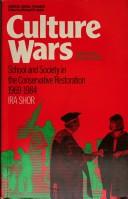
ISBN: 0710206496 Year: 1986 Volume: *4 Publisher: Boston (Mass.) : Routledge and Kegan Paul,
Abstract | Keywords | Export | Availability | Bookmark
 Loading...
Loading...Choose an application
- Reference Manager
- EndNote
- RefWorks (Direct export to RefWorks)
Conservatism --- Culture conflict --- Education --- Educational change --- Educational sociology --- History --- Curricula --- Political aspects --- United States --- 20th century --- Politics and education --- Education and sociology --- Social problems in education --- Society and education --- Sociology, Educational --- Children --- Education, Primitive --- Education of children --- Human resource development --- Instruction --- Pedagogy --- Schooling --- Students --- Youth --- Cultural conflict --- Culture wars --- Conflict of cultures --- Intercultural conflict --- Sociology --- Civilization --- Learning and scholarship --- Mental discipline --- Schools --- Teaching --- Training --- Social conflict --- Aims and objectives
| Listing 1 - 10 of 33 | << page >> |
Sort by
|

 Search
Search Feedback
Feedback About UniCat
About UniCat  Help
Help News
News